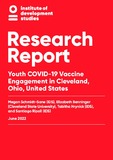| dc.contributor.author | Schmidt-Sane, Megan | |
| dc.contributor.author | Benninger, Elizabeth | |
| dc.contributor.author | Hrynick, Tabitha | |
| dc.contributor.author | Ripoll, Santiago | |
| dc.coverage.spatial | USA | en |
| dc.date.accessioned | 2022-06-14T08:03:56Z | |
| dc.date.available | 2022-06-14T08:03:56Z | |
| dc.date.issued | 2022-06 | |
| dc.identifier.citation | Schmidt-Sane, M.; Benninger, E.; Hrynick, T. and Ripoll, S. (2022) Research Report: Youth COVID-19 Vaccine Engagement in Cleveland, Ohio, United States, Brighton: Institute of Development Studies, DOI: 10.19088/IDS.2022.040 | en |
| dc.identifier.uri | https://opendocs.ids.ac.uk/opendocs/handle/20.500.12413/17460 | |
| dc.description.abstract | Despite overall progress in COVID-19 vaccination rates in Cleveland, vaccine inequity persists as young people from minority communities are often less likely to be vaccinated. COVID-19 vaccine hesitancy is not just an issue of misinformation or lack of information. Vaccine hesitancy among young people is reflective of wider issues such as mistrust in the state or the medical establishment and negative experiences during the pandemic.
This report is based on case study research conducted among minority youth (ages 12-18) in Cleveland, Ohio. While public discourse may label young people as “vaccine hesitant,” we found that there were hesitation differences based on social location and place. We found the greatest vaccine hesitancy among older youth (15+ years old), particularly those from minoritized communities.
Unvaccinated youth were also more likely to be from families and friend groups that were unvaccinated. While some expressed distrust of the vaccines, others reported that COVID-19 prevention was not a priority in their lives. Instead, concerns over food security, livelihood, and education take precedence. Minority youth were more likely to report negative experiences with authorities, including teachers at their schools and police in their communities.
Our findings demonstrate that COVID-19 vaccine hesitancy is embedded in a context that drives relationships of mistrust between minority communities and authorities, with implications for COVID-19 vaccine uptake. Young people’s attitudes toward vaccines are further patterned by experiences within their community, school, family, and friend groups. | en |
| dc.language.iso | en | en |
| dc.publisher | Institute of Development Studies | en |
| dc.rights.uri | http://creativecommons.org/licenses/by-nc/4.0/ | en |
| dc.subject | Health | en |
| dc.title | Youth COVID-19 Vaccine Engagement in Cleveland, Ohio, United States | en |
| dc.type | IDS Research Report | en |
| dc.rights.holder | © Institute of Development Studies 2022 | en |
| dc.identifier.doi | 10.19088/IDS.2022.040 | |
| rioxxterms.funder | Default funder | en |
| rioxxterms.identifier.project | Default project | en |
| rioxxterms.version | NA | en |
| rioxxterms.versionofrecord | 10.19088/IDS.2022.040 | en |
| rioxxterms.funder.project | 9ce4e4dc-26e9-4d78-96e9-15e4dcac0642 | en |


